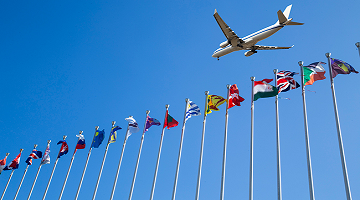
In June 2019, the UK became the first major world economy to legislate for net zero carbon emissions by 2050. To reach the goal of net zero carbon emissions from UK aviation, the UK aerospace and aviation industry set out a clear and credible roadmap to reduce carbon emissions over the next few decades, including through the development of zero emission aircraft, the rollout of sustainable aviation fuels, and improvements to existing operations.
Aviation is, by definition, a global industry. Nonetheless, investment through the Aerospace Technology Institute (ATI) would remove over 600m tonnes of carbon through UK developed technology by 2050, representing around 20 percent of the total emissions saved by 2050 through ultra-efficient aircraft improvements and zero-carbon emission technology.
On top of progress towards net zero within the UK, international cooperation will also be a foundational step on the road to net zero. This week, ADS were glad to welcome a significant development in the quest for net zero in global aviation, as the global air transport industry adopted a long-term goal of net zero carbon emissions by 2050, as announced by the Air Transport Action Group (ATAG), representatives of the entire global aviation community.
Flying is a public good, helping to make the world a more connected place by bringing families together, delivering cargo, driving business opportunities, and empowering tourism. By 2050, the aviation and aerospace industry will need to meet the needs of 10 billion passengers globally in a sustainable and environmentally considerate way, and the goal adopted this week is demonstrative of the ambition with which global aviation is approaching this sustainability challenge.
While the industry commitment is clear, delivering sustainable flying will require close collaboration between industry, government, and academia to implement a policy framework that will allow innovation to flourish. In the UK, ADS recently responded positively to the UK’s Jet Zero consultation, setting out the Department for Transport’s strategy to achieve net zero aviation by 2050.
Internationally, however, the focus is on the International Civil Aviation Organisation (ICAO) to deliver a global policy framework to reach net zero. ICAO’s Carbon Offsetting and Reduction Scheme for International Aviation (CORSIA), a global offsetting scheme designed to incentivise the reduction of emissions from aviation, was a ground-breaking agreement between States to reduce carbon emissions.
This week’s announcement that all of the global air transport industry has joined in the commitment to net zero will hopefully encourage further evolutions of climate policy at ICAO, building on the good work done to deliver CORSIA. The 41st gathering of ICAO’s General Assembly next September would be a prime opportunity for member states to join the global air transport industry and commit to a long-term aspirational climate goal. This would be an important moment on the journey to reducing global carbon emissions to net zero by 2050.





